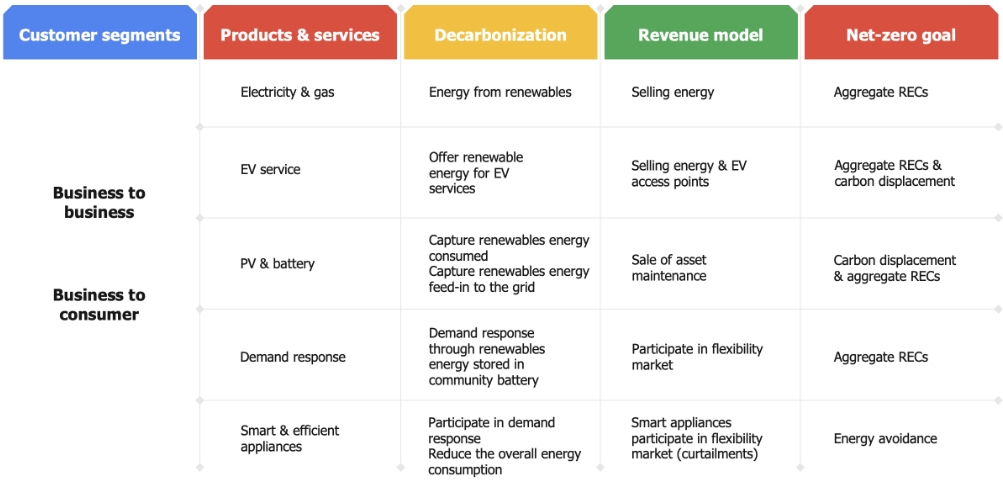Globally, transforming into a responsible and sustainable business has become table stakes for organizations in all industries. Increasing pressure from customers, regulators and shareholders to reduce carbon emissions impacts how energy is sourced, transmitted and consumed. In the utility sector, some report and declare their carbon footprint through the Carbon Disclosure Initiative. The carbon initiative is now expanding in scope to include water use, efficiency and investments in distributed energy resources (DER). And it is likely to evolve further. While this shift is putting an additional burden on utilities to decarbonize the value chain, it brings opportunities for new business models and growth.
Beyond Selling Energy
Utility companies and governments have been driving energy efficiency programs to help consumers reduce consumption through behavioral changes and incentives. Some popular programs are rebates for energy-efficient appliances, home energy assessment programs, and incentives for energy-efficient upgrades to homes and businesses. Additional incentives are available for renewable technologies like solar panels/storage and electric vehicles (EVs).
These initiatives help customers reduce consumption, decarbonize personal transport and participate in the energy economy through feed-in tariffs, community batteries/nuanced demand response programs, etc. And with the progress in IoT and advanced analytics, utilities and customers understand energy consumption patterns and appliance-level energy consumption details. This information will help consumers change habits to reduce or shift consumption to energy-efficient sources/times. The demand for this information is introducing new business models around monetizing this data.
Energy companies are beginning to create business models where decarbonization can be profitable. Utilities can add revenue from initiatives like renewable energy credits, carbon offsets, energy efficiency programs, demand response programs, etc. Energy companies, through a combination of partnerships, acquisition of niche platform companies, or through internal innovation initiatives, are incubating and launching these solutions.
Customer-led Framework to Decarbonization Adds Revenue
Beyond energy commodities, energy solutions are key enablers in reducing carbon emissions. As such, they should be treated as product offerings to help customers reduce their carbon footprint. A winning model should provide customer engagement and easy adoption and tools for customers to jump onto the decarbonization bandwagon. Energy organizations can structure their products and services to align with customer segments (B2C and B2B) with the intent to decarbonize, as depicted below.

Start by adopting a portfolio approach, mapping customers’ current energy footprint, setting decarbonization goals and developing/implementing the right energy products and services to achieve those goals. These endeavors can be scaled using a suite of digital tools, (especially for the B2C segment) complemented by appropriate human touch points in customer service channels. (In the B2B segment, account managers can tailor solutions to individual customer needs.)
The framework can include the following steps:
The B2C business could benefit from a digital-led model (with agent support), whereas the B2B business will continue to benefit from an account management-led strategy but amplified through digital. Utility companies must focus on IT platforms and solutions based on modern IT architecture principles that enable business agility, flexibility and scalability. Government/regulatory policies that are consistent and carbon-friendly will help utility companies make bold bets without anxiety about their past financial investments and deliver profitable/sustainable growth to all stakeholders. By following a customer-led approach, utilities can achieve growth through decarbonization.
Ravindra Balija
Cloud Technology Partner, Wipro Limited
Ravindra has over 25 years of IT experience and helps customers adopt public cloud technologies. Before this role, Ravindra worked in the ENU Business Unit and with Energy and Utility customers for 18 years. He focuses on application modernization by leveraging public cloud platforms, and serverless and cloud-native architectures.
Madhu Sudhana Reddy
General Manager, Head of Customer, Metering and Billing Practice, Utilities, Wipro Limited
Madhu has 20+ years of global experience working with utilities in consulting, solution architecture, program management and delivery capabilities. At Wipro, Madhu is responsible for evolving cloud partnerships and growing the utility business globally. He has a Post Graduate Diploma in Enterprise Management from the Indian Institute of Management, Bangalore.